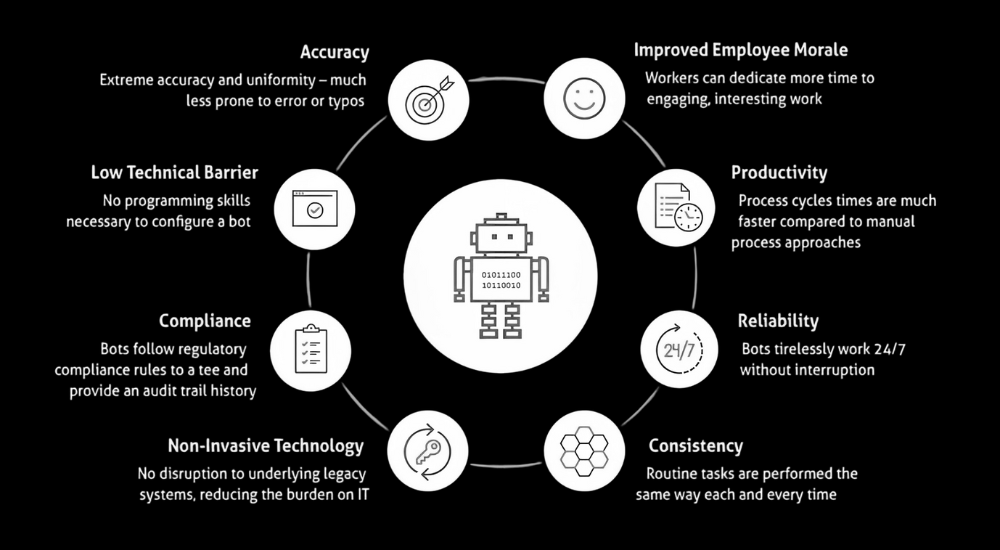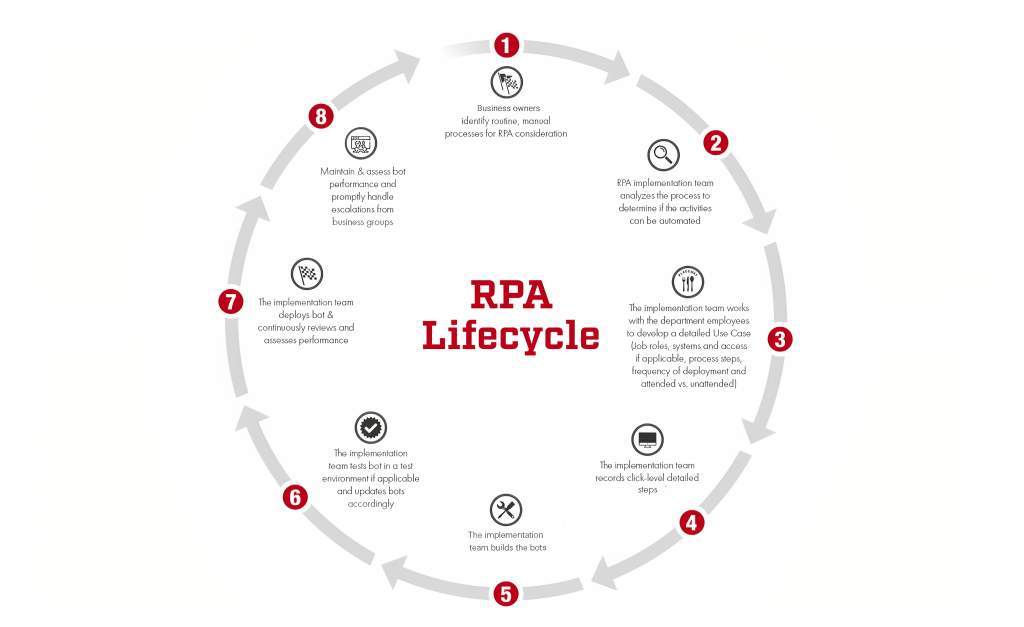- Home
- Sadastech's Services
Intelligent RPA
Robotic Process Automation (RPA) is a software technology that makes it easy to build, deploy, and manage software robots that emulate humans actions interacting with digital systems and software. RPA delivers the ultimate scalable digital workforce that will enable your business to grow by discovering new efficiencies, increasing productivity, reducing costs and removing human error. Your RPA bots will also free your employees to perform higher-value activities such as interacting, creating and problem-solving.
What are the benefits of RPA?
As a user-friendly and cost-effective tool, robotic process automation provides a number ofadvantages that are drawing interest from organizations across industries.
Programming skills are not necessary to configure a bot. Non-technical staff can use a process recorder feature to teach the bot how to perform a previously manual step in an automated business process, and integrate the bot-based automation into a larger automated workflow using a drag-and-drop process designer or similar tool.
Like many tools available as part of a process automation suite, bots are extremely accurate and consistent they are much less prone to making mistakes or typos than a human worker. This can apply to common processes such as setting up or removing user accounts, copying information from one system to another, onboarding and off-boarding employees or populating forms based on information from another system.
Bots can work tirelessly work around the clock, autonomously without requiring employees to re-activate them, allowing a more flexible schedule for business processes.
Unlike traditional integrations that may require extensive developer resources, RPA doesn’t require any changes to the systems you already use every day to be included as part of your automated business processes. Bots work directly from a user interface, just as a person would. This makes robotic process automation especially useful for integrating legacy systems, where APIs may not be immediately available, or in situations where organizations do not have the time or employee resources to develop custom code-based integrations.
By utilizing robotic process automation as part of their automation tooklkit, organizations can open up further opportunities for employees to dedicate more of their time and talent to other work. While bots fill out forms, enter data and look up information from websites, employees can focus on high-impact projects that further drive growth.
Process cycle times are more efficient and can be completed at a faster speed compared to manual processes.
Bots only follow the instructions they have been configured to follow and provide an audit trail history for each step. The controlled nature of bots makes robotic process automation well suited for organizations that want to automate their business processes end-to-end while still meeting strict compliance standards.
What processes are relevant to RPA?
Robotic process automation is a versatile, scalable technology that can be applied throughout the enterprise in a variety of industries.
Top candidates for optimization with RPA are typically:

Limited Decisions

Prone to Human Error

Consistent & Routine

Manual Data Entry

High Data Volume
Common Intelligent RPA Solution Use Cases:
Healthcare
The healthcare industry relies on accuracy, efficiency, and scalability in its daily operations. From patient scheduling to billing and everything in between, the automation of healthcare is increasing patient satisfaction, reducing costs, and improving quality care. RPA can automate critical tasks such as online scheduling, discharge instructions, and data migration, which can save your team time and resources while increasing productivity.
Banking
Banking and financial institutions are investing in RPA to improve trading, compliance, internal controls, customer service levels, and error reduction. From loan processing to report generation, RPA is streamlining routine processes for banking teams. The implementation of RPA allows your team to save time by completing everyday tasks. One RPA use case in banking revolves around account closure. This lengthy process often requires multiple steps that may be completed manually. Speed up the closure process by using RPA to automate the most time-consuming steps.
Finance & Accounting
RPA can automate repetitive tasks for a finance team, helping them stay focused on sensitive tasks that require a more human touch. The finance industry is using RPA to send invoices, follow up with late payments, and complete other back-end functions such as updating customer data and billing records. These processes can easily be automated with RPA, freeing up time for teams to focus on other priorities. RPA can improve accuracy and efficiency to provide more precise information for tasks such as invoice processing, tax reporting, and accounts receivable.
Human Resources
The human resources (HR) industry handles more than its fair share of time-consuming tasks. With RPA, HR professionals can automate daily tasks such as sending out mass emails, updating data and records, onboarding team members, and managing payroll.
For example, when a new employee is hired, HR is faced with onboarding tasks and paperwork that can take more time than they have in a day. RPA can automate the task of sending out welcome emails, entering new hire information, and adding the new member to payroll. This automation saves HR time to help hires get up to speed on company priorities.
IT Operations
Many IT departments have made the switch to RPA to automate routine tasks that don’t require human attention, allowing them to spend more time on complex projects. Tasks like password resets, user notifications, and software installation or updates can be automated to free up your IT departments’ time.
RPA further helps improve accuracy across your entire organization by standardizing tasks such as creating tickets for customer service requests or submitting expense reports. Gone are the days where your IT specialists are spending time on routine tasks.
Manufacturing
The manufacturing industry has taken to RPA to automate the endless manual tasks that dominate the workday. Previously, manufacturing professionals would spend their days filling out paperwork for inventory management. Now, RPA software can manage invoices and paperwork automatically. Professionals can receive real-time inventory reports and understand what products they have on hand.
Customer Service
Customer service is an essential part of every company. When customer service is not optimized, your company will likely see a negative impact. RPA can assist with routine tasks that take up too much time, allowing employees to focus on fostering better customer relationships.
Bottlenecks can occur when customer service representatives become overwhelmed. This may include customers having longer wait times when in need of assistance. RPA-powered chatbots can assist in answering customer questions in real-time. Customers will no longer need to wait for a representative to have their questions answered.
Marketing
The marketing industry thrives off of data points. Data is how marketing professionals track the success of their efforts. However, collecting this data can be overly tedious. RPA software can help speed up the process and provide more detailed reports on the progress of campaigns, content, and more. From social media monitoring to performance tracking, RPA can analyze the data and generate reports that inform marketing decisions.
Its Time to Transform!
Leverage our state-of-art technologies to facilitate the digital transformation that get results.

Sadastech is a leading technology service provider in the fast-growing field of Intelligent Automation. We partner with large enterprises in their Digital Transformation journey and help them and their employees thrive in the Future of Work. We have offices in America, Malaysia & India and offer solutions via our unique ‘Global Boutique’ delivery model.
Useful Links
- Home
- Resources
- Contact Us
Our Services
- Agentic Process Automation (APA)
- Intelligent Automation Solutions
- Intelligent RPA
- Intelligent Document Processing
- RPA as a Service (RPAaaS)
©2023. Sadastech. All Rights Reserved.


